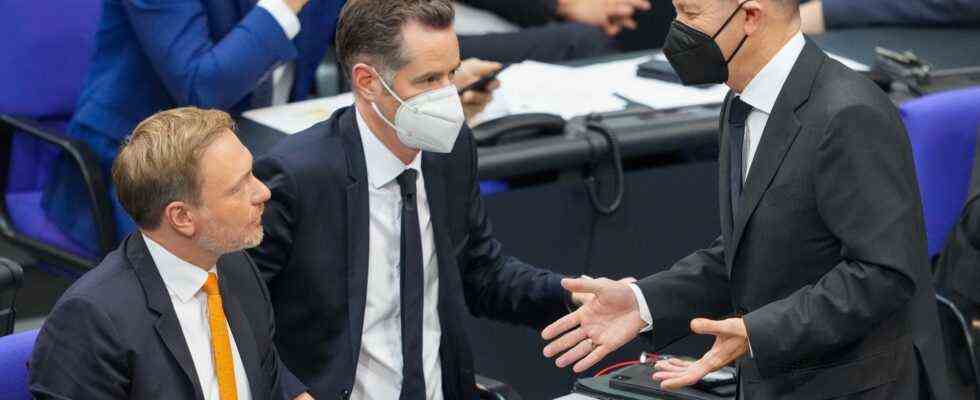Status: 11.11.2021 6:12 p.m.
In the Bundestag debate on Belarus, the Union insisted on pointing out the differences between the traffic light parties on the issue of migration – but these showed little evidence of this. Foreign Minister Maas urged more sanctions.
In view of the conflict over migrants on the Belarusian-Polish border, the future traffic light partners in the Bundestag have shown unity. During the debate, the current Federal Foreign Minister Heiko Maas emphasized that more sanctions were needed against the regime of the Belarusian ruler Alexander Lukashenko. This also concerns central branches of the economy and measures against the transit countries and airlines involved. Maas added that it was legally difficult to sanction the airlines, but he spoke about suspending landing rights. The migrants stranded at the border, however, needed help, according to the SPD politician.
Attacks from the Union
Representatives of the Greens and the FDP made similar statements. There was criticism, however, from the CDU and CSU. Union parliamentary group vice-chairman Thorsten Frei (CDU) called on the SPD “that it does not leave the center in migration policy, that it does not allow itself to be pulled to the left by the Greens”. The “unsuccessfulness of the Greens in the field of climate policy” should apparently be overcompensated by an “inviting migration policy,” said Frei, referring to the exploratory paper of the traffic light parties. He is particularly excited about the FDP, “which basically says the opposite of what the Greens want”.
In the exploratory results of the SPD, Greens and FDP, among other things, the desired traffic light coalition wants to “make efforts (…) with the European partners to end the dying on the Mediterranean as well as the suffering at the European external borders”. In the asylum policy, the FDP has followed a much more restrictive course than the Greens in recent years, some of whom are in favor of clear relief. The SPD, on the other hand, largely left the issue to the GroKo partner CDU / CSU during the joint reign.
Greens and FDP: situation too serious for polemics
In the Belarus debate requested by the Union parliamentary group, little of these differences was felt. The situation is too serious for polemics, replied FDP and Green politicians on Frei. The European spokeswoman for the Green Group, Franziska Brantner, largely agreed with Maas’ announcements and called for information campaigns in countries of origin to prevent migrants from traveling to Europe via Belarus. Against Russia and President Vladimir Putin, who covers “this perfidious blackmail attempt” by Belarusian President Alexander Lukashenko, “a new policy of dialogue and hardship” is needed.
There was support from the Union for this last point. The CDU member of the Bundestag Johann Wadephul also emphasized that Putin could “immediately stop” Lukashenko’s actions at the EU borders with Poland, Lithuania and Latvia.
No representative of the traffic light parties made demands, for example, to accept migrants, who are likely to meet with opposition from the FDP. What was also missing: clear positions on a debate within the European Union on financial support for the construction of further fortifications on the external border. Twelve EU countries, including Poland, Lithuania and Latvia bordering Belarus, but also Denmark, Austria and Hungary, are calling for “physical barriers” – financed at best from EU funds.
Thousands of migrants are waiting at the border
Thousands of refugees are waiting in dire conditions on the border between Belarus and Poland. The EU accuses Lukashenko of deliberately bringing migrants into the country in order to then bring them to the border to continue their journey. The Belarusian ruler is trying to destabilize the international community with a “hybrid attack”.
This also works because the EU has not been able to agree on a sustainable reform of the common asylum and migration policy for years. The reality at the EU’s external borders already consists in many cases of barbed wire and fences. How the coming federal government will act is still open.
Tichanovskaya as guest of honor at the debate
The Belarusian opposition leader Svetlana Tichanovskaya took part as the guest of honor in the debate, and was received with standing applause by the MPs. Bundestag President Bärbel Bas welcomed them and wished “that the people of Belarus will shape their fortunes with free and also parliamentary debates in the future”.
Tichanowskaja did not speak publicly today – not even after her visit to Federal President Frank-Walter Steinmeier. This week she called for the EU to maintain its position of strength and not allow itself to be blackmailed by Lukashenko.

